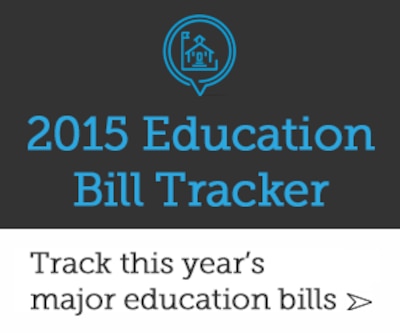This year’s proposal to change the regulation of online schools that operate across multiple districts was killed Monday by the Senate State Affairs Committee.
The 3-2 vote was expected. Senate Bill 15-201 had bipartisan backing, but its Republican sponsor, Sen. Owen Hill of Colorado Springs, admitted that he didn’t have the time to get the bill into the shape he wanted. He asked the committee to postpone the bill indefinitely.
Multi-district online programs have been dogged for years by persistent problems with low student retention, achievement and graduation rates. Those issues have been repeatedly documented by official reports, annual state data, and media reporting, including an award-winning 2011 series by Education News Colorado, Chalkbeat’s predecessor news service.
But the legislative has passed no significant online oversight legislation since 2007, following a critical 2006 state audit of online programs. Recent legislative attempts to tackle the issue have been stalled by politics and effective lobbying by schools.
SB 15-201 largely incorporated the recommendations of the Online Task Force, an advisory panel that studied the issue over the summer and fall. (Get bill details here.)
Currently the Department of Education reviews multi-district online programs and decides if they can operate. Then districts can agree to authorize a program as a charter. But there’s been concern that some smaller districts don’t have the expertise to oversee such programs, even if they’ve been approved by state. The bill proposed to have CDE review districts and decide if they had the ability to oversee an online program. Only districts authorized by the state could authorize the programs as charters.

Some online advocates feel extra oversight isn’t needed and that it’s sufficient for the schools to be rated by the state’s accreditation system, as all schools are.
Bill sponsor Sen. Andy Kerr, R-Lakewood, and task force chair Ethan Hemming made brief, polite plugs for the bill.
Ahead of his request to kill the measure, Hill said, “I need to apologize to Sen. Kerr. I may have bit off a little more than I could chew. … I didn’t have the time to devote to” making fixes in the measure.
Hill is chair of the Senate Education Committee and at the center of education issues in the GOP-controlled Senate. Hill’s testing bill was introduced only last Friday, later than many people had expected. And work on the 2015-16 school finance bill, which Hill will carry in the Senate, also is lagging behind schedule.
Buckner allows more time on incident reporting bill
After a two-hour hearing, the chair of the House Education Committee Monday delayed action on a school incident reporting bill and asked sponsors to work with various interest groups to amend the measure.
Given divisions among those groups, Rep. John Buckner told sponsor Rep. Polly Lawrence, R-Littleton, to work more on the bill. “It seems to be we might be able to get where we need to go” with further negotiations, he said.
House Bill 15-1273 proposes to update the system by which school criminal incidents are reported to the state and, ultimately, to the public.
Among other requirements, the bill would require separate reporting of marijuana-related incidents and of sexual assaults, two things that now are included in catch-all categories. Current law requires reporting of assaults, incidents involving weapons, robbery, drug offenses in general, and various other kinds of incidents.
The bill also would create a new, supposedly more streamlined way for police and sheriffs’ departments and district attorneys’ offices to report school-related incidents to the state.
Hearing testimony revealed that some law enforcement agencies and district attorneys haven’t been following the reporting requirements of a 2012 law.
That troubled Buckner, an Aurora Democrat. “I don’t understand why law enforcement agencies and DAs don’t comply with the law.” He never got a good answer, other than that the old reporting requirements are time-consuming and that the state didn’t provide money to pay for them.
HB 15-1273 also would require the state Department of Public Safety to make statewide school crime reports publicly available. (Get more information on the bill’s details here.)
School districts oppose the bill because they feel the sexual assault reporting requirements, which would be based on federal Title IX standards, are too stringent. County sheriffs oppose the bill because they feel it would mean more work with no funding.
But witnesses representing victim rights groups want the bill expanded to cover reporting of dating abuse incidents.
For the record
Another measure related to student discipline, House Bill 15-1240, passed the full House Monday morning 34-31. The bill would encourage school districts to reach formal agreements with local law enforcement on how to handle student-police contacts. The goal is reduce the number of school problems that get referred to police. The bill probably won’t get far in the Senate.

